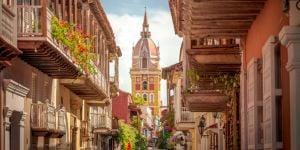Are Colombia Expats underpaying their income & wealth tax?
Last activity 08 August 2023 by Lpdiver
677 Views
32 replies
Subscribe to the topic
Post new topic
I will be researching that question further, but in the meantime, there is a new blog post by the law firm of Langon titled "Filing Personal Taxes in Colombia: A Comprehensive Guide 2023".
No link to be provided.
Interesting thing I find about Langon's website, is they don't identify Immigration law as an area of practice.
- Business Law
- Real Estate Law
- Commercial Law
- Litigation
- Family law
- Estate Planning
- Employment Law
- Criminal Law
On the other hand, the attorney Christoph (first name) includes immigration law:
- Immigration Law and Visas
- CM Legal has many years of experience in applying for Colombian visas: To date, approximately 300 visa applications have been successfully completed for foreign clients from all over the world. CM Legal manages the entire visa process, from selection of the most appropriate type of visa to obtaining the physical visa in the passport through CM Legal’s messenger service in Bogotá.
Interesting thing I find about Langon's website, is they don't identify Immigration law as an area of practice.
Business Law
Real Estate Law
Commercial Law
Litigation
Family law
Estate Planning
Employment Law
Criminal Law
I need to make a correction for Langon since under the category "litigation" is immigration related matters.
When the decisions made by Colombian visa and immigration government agencies affect your business and/or your personal life you will need a law firm that can navigate the local legal landscape in order to protect your interests.
Our law firm regularly represents clients before the Ministry of Foreign Affairs as well as other administrative and civil courts in connection with a variety of immigration and visa matters including but not limited to:
- denial of visa applications;
- delays to visa applications;
- deportation/removal processes;
- habeas Corpus petitions (“peticiones de hábeas corpus”);
- government misconduct; and permits to stay in the country.
Mr. Bailey
Do you live in Colombia , have you ever been here do you plan to come here or do you just follow what you see on YouTube and the Interne?
Best way to know how things work in real life is come to Colombia and sink or swim .
I can guarantte you they wont throw you on jail or stop you from leaving the country for some minor infracción.
There are volumes and volumes of laws and bylaws in Colombia nobody knows about and nobody follows, on a daily basis. The written law and the law as practiced are 2 different thiinngs in Colombia.
Btw..those 2 lawyers are probably the 2 best options if you have a " difficult" visa case.
But first try you should do it by yourself.
Actually visas in Colombia are becoming a royal pain in the butt
@nico peligro
I hope for your meetings with those lawyers, that you ask a lot of questions and take a lot of notes, so you can educate your cohorts like Fentanilo on their obligations to the Colombian state. And it is not enough that those suits pull an opinion out of their butt; they need to cite the law they are interpreting, as if they were prepared to write a memo and sign their name to it.
P.S. It is good to have you back in the expat.com fold, where links are clickable.
I'm living in Colombia, and Taxes laws, there are probably none, except that the law about income taxes, give entire power to one "entity" called "DIAN" (direction of national taxes), so, they do what they want. First of all, if you have an income superior to the minimum (50 000 000 colombian pesos/year), you have to go at the DIAN and make all the papers to get a RUT (unique tax register). If you're late, there's a fine to pay (in relation of the delay, in days). So, by your RUT number, you 'll have the precise ultimate day you have to pay your tax, and if the RUT you have taken, bypasses the date you must pay your taxes, you also have to pay a fine for the delay per day. Once you have the maximum date to declare, you have to pay your taxes, and declare everything (if they find an "inconsistence", you have to declare again, and to pay another fine, because they don't forgive, and consider your error a fraud). Also, if you receive your loan or retirement on a Colombian account, the bank declares every single movement on your account, so, it's better to contract the services of a bookkeeper specialist in taxes, or you expose yourself to serious problems). Last year, i had to declare for earning 1900 euros/dollars a month, and i had to pay 2500 with a fine for delaying a few days of 480 000 Colombian pesos. Personally, i had to open an account to receive my retirement loan, so i could make the credit i needed, but it was better before : I had an account in my country, and was payed directly in Euros, so i payed little fees, and i withdrew my loan directly at the ATM, so, it is considered as if the money never touched the Colombian soil, and i never had to pay taxes before i opened a bank account here. To reverse this situation, i plan to open another account in my country, to withdraw the money at the atm again, and i'll only put in my Colombian account, the strict necesary to pay the credits and credit cards, so, i'll never bypass the 50 000 000 limit in my transactions/account/credit cards movements.
@Jean Louis23
If I understand your post correctly, you feel like you popped up on DIAN's radar because of the bank account that you opened in Colombia. Further you feel like you would have stayed off of their radar if you had simply used ATM withdrawals to pay your bills. This is a strategy that has been mentioned in this and the other forum often. I am wondering though, since you are already on DIAN's radar if using ATM's will now allow you to escape their scrutiny.
Best of luck,
elp
From the blog "Even if you 1. were a tax resident in 2022 and/or 2. engaged in certain Colombian-related activities it doesn’t necessarily mean you actually have to file taxes in Colombia. You would be required to file taxes if:
the gross net worth at the end of the taxable year 2022 is equal to or greater than COP $171,018,000; OR
the total annual income is equal to or greater than COP $53,206,000; OR
your total credit card charges for the entire calendar year is equal to or greater than COP $53,206,000; OR
the total value of all your purchases/expenses for the entire calendar year is equal to or greater than COP $53,206,000; OR
the total accumulated value of bank deposits or financial investments for the entire calendar year is equal to or greater than COP $53,206,000.
Note that there is some debate in the accounting/tax community in Colombia as to whether these thresholds should measure Colombian-only activity or whether they need to include activity on a worldwide basis. Our accountants interpret the relevant rules to include worldwide activity."
Our accountants interpret the relevant rules to include worldwide activity on credit card purchases? Must be reading wrong or there is a mistake
At least when they talk about siezing assets they only infer locally.
Glad i stay less than 6 months per calendar
@Mr. Barley From the blog "Even if you 1. were a tax resident in 2022 and/or 2. engaged in certain Colombian-related activities it doesn’t necessarily mean you actually have to file taxes in Colombia. You would be required to file taxes if:
the gross net worth at the end of the taxable year 2022 is equal to or greater than COP $171,018,000; OR
the total annual income is equal to or greater than COP $53,206,000; OR
your total credit card charges for the entire calendar year is equal to or greater than COP $53,206,000; OR
the total value of all your purchases/expenses for the entire calendar year is equal to or greater than COP $53,206,000; OR
the total accumulated value of bank deposits or financial investments for the entire calendar year is equal to or greater than COP $53,206,000.
Note that there is some debate in the accounting/tax community in Colombia as to whether these thresholds should measure Colombian-only activity or whether they need to include activity on a worldwide basis. Our accountants interpret the relevant rules to include worldwide activity."
Our accountants interpret the relevant rules to include worldwide activity on credit card purchases? Must be reading wrong or there is a mistake
At least when they talk about siezing assets they only infer locally.
@lunamick,@Jean Louis23
Assuming someone is in the country for 183 day in a 365 day period, I was thinking that the DIAN tracks atm withdrawls for purposes of determining whether you have to file. But, reading the the requirements above, it leaves the impression one can have ATM withdrawals from an account outside of Colombia above $53,206,000, and if you spend it in such a way so it doesn't get associated with your Cedula/RUC/NIT, or you stash it under the mattress, then you will be fine.
I wonder if the DIAN has a website that allows residents to check their year-to-date purchases or credit card charges?
@lunamick
20 plus years in Colombia and friends with many expats living here for over 10 years....and we have never reported cash taken out of an ATM here from a USA based bank account and we have never had a problem with DIAN. I make it a point to not do anything that would actually require me to file taxes here.
I even know expats living here that showed US based retirement income to qualify for a retirement visa that would require them to file taxes here in Colombia and DIAN never botheres them.
They never opened a checking account here or do they own real property....just cars. But some how DIAN doesn't know or doesn't care.
ATM withdrawals don't necessarily have anything
to do with Colombia tax obligations.
It's unlikely La DIAN tracks such withdrawals
unless an Expat flaunts the 'keep a low profile'
advice most Expats in Colombia follow.
Who would be so reckless as to admit
on a public forum that they underpaid a tax
or EPS obligation?
cccmedia
It's not La DIAN's mandate to track
spending by individual Expats in Colombia.
Ipso facto, it is unlikely in the extreme
that the agency would maintain a website
available to the public where anyone
could access DIAN data.
cccmedia
Dian has a website titled "DO IT YOURSELF!"
The tool will tell you if need to file. It appears that they need to update the page to indicate 2022 instead of 2021.
Da link: https://hazlotumismorenta.dian.gov.co/renta-landing.html
@Tommy Lee70 Agreed, I bump into expats all the time that just ignore the tax thing.
It is true there are many expats living in Colombia
on a small check, who can blame them,
There are many with big assets outside of Colombia
and not one i have spoken to pays a wealth tax,
Still Colombia is missing out,
Many people skip Colombia as a home because of the worldwide and wealth tax scare.
Costa Rica and Panama have many wealth expats with huge homes.
Imagine the Iva taxes Colombia would get just by attarcting wealthy expats.
Someone told me the own a nice condo here and spend a lot of money and pay taxes on the purchases they make(more than 12,000 a year US)
Thats enought so they dont file.
Thank God i have a hard time staying put for more than 90 days
I was reading blog posts on a couple sites I haven't been to before today.
One pattern I have seen in reading these blogs, is all the lawyers or facilitators claim world wide income for taxes. It seems as if the accountants/lawyers who don't agree with that, operate out of dark rooms, and won't put their name to it.
Of course, it may be that the big names have one position for the public at large, and another behind closed doors.
I met an expat who once told me his theory, If they start pressuring all the Colombians and Expats with wealth and income that spend more than 183 days a year they could lose much more in revenue. These people are buying real estae spending big money here and paying 19% in iva tax with all those purchases. Maybe they want immigrants here with income? Are they are making visas harder for some and easier for others? Maybe Colombia does not want people without income taxing thier medical system? Just wondering
@Tommy Lee70
Good to hear from a long termer with practical experience, who knows how things really work in the developing world.
Further to your post, Canadians have a tax agreement with Colombia, and if you have a residence in Canada , and your source of income is in Canada, you pay taxes ONLY in Canada, no matter how much time you spend in Colombia.
It is the same type of tax agreement All foriegners have with The government of México, and I believe Ecuador, and Canada Has with Argentina.
Where Euros and US expats in particular get in trouble is poking the dog in the first place. The more you try to follow " the rules" more attention and problems you attract.
Get an accountant involved and do a declaración de renta....this opens a big can of worms.
Try to fillow the rules to the "t", DIAN comes down on you like a bag of hammers.
You are not " under the radar" ..you are in front of their faces.jumping up and down..yelling.." pick me..pick me.. I want to give you as much money as you demand"
The Colombians dont follow these convoluted and contradoctory rules. Why should you? The Colombians are much lower hanging fruit than Expats,and have a much bigger risk in not following "the rules".
We are not in the US or Europe anymore.Things dont work the same here.
When.in Rome, do as the Romans do.
Following up on prior thought.
In a real life example, a U.S. expat in Paraguay explains what he wasn't willing to do, in order to retire in Colombia:
@lunamick I can tell you there is no logic to their thinking.
I have had a Rentista Visa for years and my iincome is ..well I would say quite a bit more than the 10 salario mínima requirement,dont use EPS or their public health system,I have private MedicinaPrepagada. I SPEND A LOT of money in Colombia and never had the need or want to go on their stupid third world public healthcare system
Yet they have been giving me a hassle on a stupid 1 year Rentista visa after being here 11 years.
As a matter of fact it seems they want me to subsidize their stupid EPS system ( which I never use) to the tune of 12% of my income stated on my Visa application ,( which would be around 2 million pesos a month,,)
Well thats apparently the idea of the particular unhinged cancilleria agent I ended up with anyway..
@nico peligro
If I qualify for a rentista visa someday, I will never pay no more than 5% (12.5% x .40) for EPS. I will also pay EPS for a given month based on the passive income I earned and deposited into my brokerage account during the prior month. I will hope that income on average totals more than 10 times the minimum wage, since I will need to qualify for another rentista visa in a year, and projections are often based on the prior year's activity. Print this comment and take it with you when you visit Christoph.
P.S.
We have a separate thread for probing Colombia expats' compliance with EPS.
I was looking at the renewed Medellin Guru website. I guess expats who are required to file income taxes, will be doing so soon using Form 210 if they are tax residents.
The filing dates in Colombia for income taxes and foreign asset tax for individuals for the tax year 2022 will begin on August 9, 2023, and run until October 19 of the same year.
(I need to research what that "foreign asset tax" is.)
As for the wealth tax, those expats with world wide assets exceeding 3.053.664.000 pesos on January 1st, 2023, would have already filed using form 420.
The filing dates of the "wealth tax" for the taxable year 2023 will be from May 9 to 23, 2023.
Tell me if I am wrong, but I think even Canadians who can disregard income taxes due to the treaty between Canada and Colombia, have to at least give the wealth tax a passing thought if they are rentistas.
@Mr. Barley i dont give it even a passing thought.
I dont have enough money to qualify anyway, even if I was a Colombian tax resident.
As a matter of fact , I know Americans and Colombians and others who are multi millionaires with large overseas assets and theoretically liable who dont worry about it.
I have never heard of any one paying the wealth tax.
Nico
"I have never heard of any one paying the wealth tax."
Agree but to be safe and because i love to travel and have roots in CR
i stay only 180 days
Anyone on the board who has paid the wealth tax?
My concern for some expats applying as rentistas would be that they do so using bond interest income when yields are around, say 3%. If we say that they project 30,000 of income to the cancillería, then they are effectively announcing to them that they have around 1,000,000 US in bonds, which would put them over the wealth tax threshold at today's conversion by at least $200,000? Maybe that wouldn't cost them too much if the rate is around 1%.
@Mr. Barley first off Cancilleria doesnt talk to DIAN, not in their job descripción
Second off, they dont do math either, and they would have no idea what type of investments you have.
You are over thinking and being paranoid like so many people on these forums.
You should listen to the likes of SouthAmerica Voyager and the other guy Tommy Lee 70 who have been in the country 10 or 20 plus years.
This whole tax paranoia only started when it became a popular subject on these forums.
You never heard about it on the old PBH forum.
No matter how many posts appear on this thread,
no matter what statistics are produced about
the percentage of Expats who pay whatever ..
in the end it's up to each individual to decide
how much to pay. Preferably after discussing
his or her situation with a true expert.
Nico's point about tax paranoia is valid.
cccmedia
i haven't read the latest article yet from Medellin Advisor, but probably will.
Last July 31, 2023, was the deadline given by the Dirección de Impuestos y Aduanas Nacionales (DIAN) to report the Registro Único de Beneficiarios Finales (RUB), which is a key tool in the fight against money laundering, terrorist financing, and tax evasion in Colombia.
I actually found the introductory paragraph of the email by Medellin Advisors more interesting than the actual article. Where are the cohorts to confirm they have received these inquiries?
If you own a property or a business in Medellin, it is very likely that you have been contacted recently by the administación (HOA) of your building or your accountant asking to provide a bunch of detailed information about your assets. These kinds of inquiries can be disconcerting for the most privacy-conscious individuals, and many may have even considered avoiding responding altogether. But what is the legal basis for these inquiries
@Jean Louis23 good post, seems like they cant or dont keep track of Atm or foreigh CC purchases from people i talk to that live more than 6 months.
But iam not sure since i am not a tax resisdent
Articles to help you in your expat project in Colombia
 The taxation system in Colombia
The taxation system in ColombiaAny foreigner working in Colombia is liable for taxes. The main national taxes are the income tax, the income tax ...
 How to drive in Colombia
How to drive in ColombiaAny foreigner entering Colombia on a tourist visa is permitted to drive with the valid driver licence from their ...
 Leisure activities in Colombia
Leisure activities in ColombiaBoth visitors and those who stay long term in Colombia will have no shortage of things to do. Colombia's rich ...
 Phones and internet in Colombia
Phones and internet in ColombiaKeeping in touch with friends and family is a top concern no matter where you are living. In order to stay in ...
 The healthcare system in Colombia
The healthcare system in ColombiaHealthcare is a primary concern for anyone moving abroad and future expats will be happy to learn about the ...
 The Working Holiday Visa for Colombia
The Working Holiday Visa for ColombiaWhat makes Colombia unique is that it is one of the most diverse countries in the world, bordered by two oceans ...
 I Speak Colombian ? Words And Phrases That Will Help You Better Understand Colombia
I Speak Colombian ? Words And Phrases That Will Help You Better Understand ColombiaProbably the best thing about speaking Spanish in Colombia is that you can don’t have to really learn the ...
 Childcare, family activities and education in Colombia
Childcare, family activities and education in ColombiaFamily is extremely important to Colombians and many expats find it a great place to raise children. Colombia ...
Find more topics on the Colombia forum



